Affiliate disclosure: This post may contain affiliate links. Please see our Privacy Policy.
Preserving eggs without refrigeration is a challenge people have faced for centuries. How do you keep the abundance of spring-laid eggs fresh and usable when your hens stop laying in the winter?
Storing eggs in limewater is a time-tested method for preserving fresh, unwashed eggs without refrigeration. This traditional technique uses food-grade pickling lime to seal the eggshells, keeping them fresh for up to a year or more.
Whether you’re raising your own backyard flock or buying from a local farm, it’s one of the most dependable ways to stretch your spring surplus into the winter baking season, no freezer, fridge, or fancy equipment required.
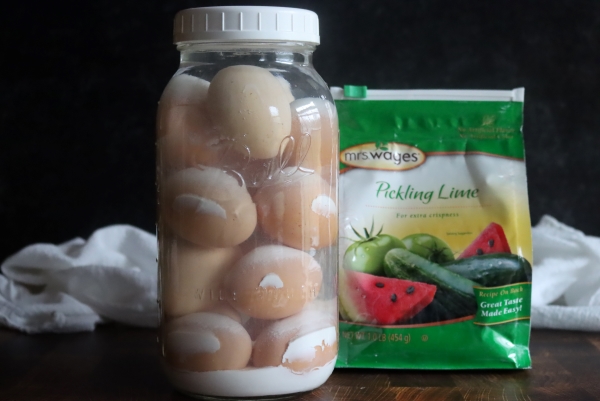
Table of Contents
- Basics of Preserving Eggs
- How Limewater Preservation Works
- Is Limewater the Same as Waterglassing Eggs?
- What You’ll Need
- How to Make Limewater for Egg Storage
- How to Store Eggs in Limewater
- How Long Do Eggs Last in Limewater?
- Does It Change the Taste or Texture?
- Alternative Historical Lime-Based Egg Preservation
- Can I Use Grocery Store Eggs?
- Storing Eggs in Limewater Recipe
- Food Preservation Tutorials
- Frequently Asked Questions
Anyone who keeps chickens knows the struggle: your hens are laying more eggs than you can handle in spring and summer, and then suddenly stop just when the days grow short and you finally feel like baking again. Historically, people had dozens of methods to store eggs for the off-season, but most have drawbacks.
One method stands out for its simplicity, effectiveness, and proven history: storing eggs in a food-safe lime solution made with pickling lime.
I started using limewater preservation because the seasonal rhythm of egg laying never quite matches when I want eggs most. In the spring, I’m buried in eggs but too busy in the garden to bake. By winter, when the days are short and cozy baking season hits, the hens have slowed to a crawl or stopped laying entirely.
We keep our limewater jars on a cool shelf in the basement, right next to the home-canned tomatoes and a crate of root-cellared apples. It’s a satisfying sight in the middle of January—eggs from springtime, still fresh and ready to cook.
Basics of Preserving Eggs
There are literally dozens of ways to preserve eggs.
They stored them in wood ash, wheat bran, and straw, or coated them with butter or lard, or kneaded them into homemade pasta that was hung to dry.
Most of the methods rely on a few simple principles:
- Start with clean, fresh eggs.
- Don’t wash the eggs at all. That removes their natural “bloom” that prevents bacteria from entering through pores in the shell. (Grocery store eggs are washed, and will not keep outside the refrigerator. Do not attempt this, or any other egg preservation technique with grocery store eggs.)
- Keep the eggs cool, but not too cold. An egg is a living thing, and it’ll stay fresh best unwashed and at around 50 degrees (root cellar cool).
- If possible, seal the pores off further to prevent contamination within the egg. Oil, ash, and lime are the most popular choices.
Simply storing fresh, unwashed eggs in a cool environment (around 50 degrees) will buy you a lot of time. We’ve taken our fresh eggs and stored them in the basement dependably for up to 4 months, and occasionally as long as 6 months, no treatment required (so long as they’re not washed).
If you’d like to dependably store eggs for longer than 4 months, like if you’re trying to store an overabundance of spring eggs for the next winter’s baking, you’ll need a bit of help to get them to keep that long.
While many different methods work, most have drawbacks.
Over the years, I’ve experimented with other traditional methods—storing in wood ash gave the eggs a musty flavor, and salt draws out too much moisture. Traditional waterglass (with sodium silicate) worked, but it altered the eggs enough that whites wouldn’t whip and the flavor wasn’t quite right. (Sodium silicate is used for sealing tile these days, so it’s not exactly considered food safe by modern standards either.)
So what does work? Storing eggs in a food-safe lime solution made with pickling lime (calcium hydroxide).
Limewater has been the most reliable method by far, with no off-flavors or texture changes.
By storing eggs in limewater, you can preserve the taste, texture, and function of fresh eggs for 8 to 12 months. Unlike other methods—such as coating in lard, burying in ash, or storing in salt—limewater doesn’t alter the flavor or draw moisture from the eggs. When stored properly, lime-preserved eggs can still fry up, bake, and whip like fresh.
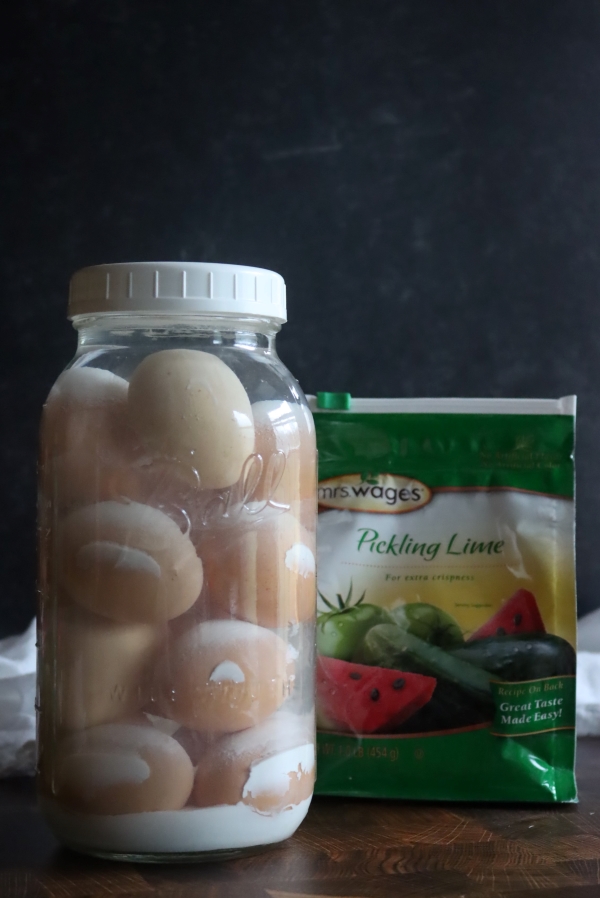
How Limewater Preservation Works
Limewater preservation works by sealing the eggshell’s pores with calcium, preventing air and bacteria from entering and stopping moisture from escaping. The lime used in this process is Food Grade Pickling Lime, also known as calcium hydroxide—a food-grade product that’s often used to firm vegetables during pickling.
Though it’s called “pickling lime,” limewater doesn’t pickle the eggs. The process keeps the eggs in the same state, and once you pull them out of the solution, they can be used just like a fresh egg. They fry up beautifully, and the white still whip to stiff peaks.
It’s called “pickling lime” because it’s used to firm up veggies before pickling, namely Limed Dill Pickles, and old-fashioned watermelon rind pickles. It works the same way to firm up the eggshells and seal them at the same time.
Don’t believe me? Here’s someone cooking with eggs after a full year in lime water:
Is Limewater the Same as Waterglassing Eggs?
These days, many people refer to preserving eggs in limewater as waterglassing, but technically, that’s not quite accurate.
Traditional waterglassing used sodium silicate (often sold as “waterglass”)—a thick, syrupy liquid that was mixed with water to preserve eggs. It was popular in the early 20th century and did an excellent job of preventing spoilage. However, sodium silicate is now more commonly used as a tile sealant or concrete hardener, and it’s no longer considered food-safe for home preservation. Eggs stored in waterglass often developed rubbery whites and wouldn’t whip properly, even if they remained edible.
The method I’m sharing here uses pickling lime (calcium hydroxide), which is still food-safe and easy to find in the canning aisle or online. While it works in a similar way—sealing the eggshell to block air and bacteria—it’s a completely different substance from waterglass.
That said, most people searching online for “how to waterglass eggs” are actually looking for this limewater method. So while it’s not technically waterglassing in the historical sense, this pickling lime method has become the modern go-to for long-term egg storage—and for good reason. It preserves both flavor and texture, and eggs stored this way can still be used for frying, baking, and even whipping.
What You’ll Need
To preserve eggs in limewater, gather the following:
- Fresh, unwashed eggs (laid that day if possible)
- Pickling lime (calcium hydroxide) – food-grade only
- Clean glass jars, ceramic crocks, or food-safe plastic buckets
- Cool storage area (like a basement or root cellar)
Do not use grocery store eggs for this method. Store-bought eggs in the U.S. are washed, which removes the protective bloom and allows bacteria to enter through the porous shell. Only use unwashed eggs from your own flock or a trusted local source.
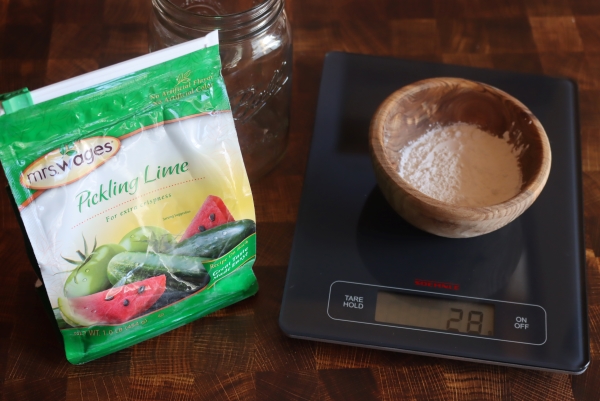
How to Make Limewater for Egg Storage
To make a saturated lime solution:
- Use 1 ounce (28g) of pickling lime per 1 quart (4 cups) of clean, cool water. This is roughly 2 heaping tablespoons of lime powder.
- Mix the lime and water in a jar or bowl. The solution will turn cloudy, and some lime will settle to the bottom—that’s normal and expected.
- This ratio ensures a saturated solution, providing a consistent seal over time without overusing lime.
One quart of solution is typically enough to fill a half-gallon jar once the eggs are added.
Don’t worry if some lime settles at the bottom of the jar—that’s normal. I’ve found that using about one ounce per quart is the sweet spot: enough to create a saturated solution without wasting lime unnecessarily.
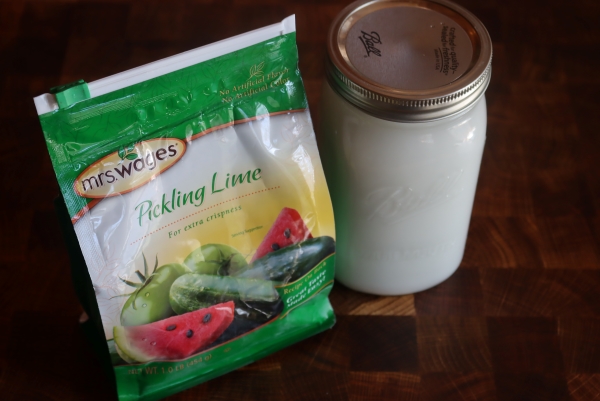
How to Store Eggs in Limewater
- Select only clean, unwashed, fresh eggs. Check for cracks or dirt—any contamination can spoil the whole batch.
- Fill a clean jar or container with eggs, placing them pointy-end down if possible, but orientation doesn’t really matter that much.
- Pour the lime solution over the eggs until they’re completely submerged.
- Cap the jar (or cover with a lid) and store in a cool, dark place—ideally around 50°F.
A half-gallon mason jar will hold roughly 14 to 18 eggs, depending on size. You can also use something like these one-gallon glass jars, which will hold about three dozen eggs.
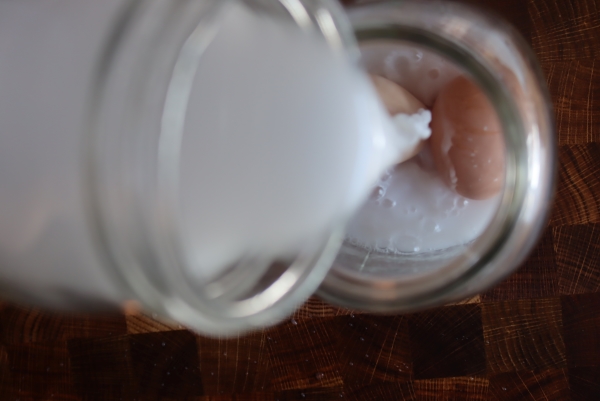
Historically, they would have been stored in wooden barrels or ceramic crocks (like this one that I use to make sauerkraut a gallon at a time).
Alternatively, a food-safe plastic bucket will work if you want to store them in bulk.
We keep our jars of eggs in the basement, right next to my home-canned goods and root-cellared apples.
Once you’re ready to use the eggs, simply remove them from the solution and give them a rinse before cracking. Rinsing ensures that the lime solution doesn’t get into the egg as it’s cracked, which will impact the flavor.
Then, cook with the eggs as you otherwise would.
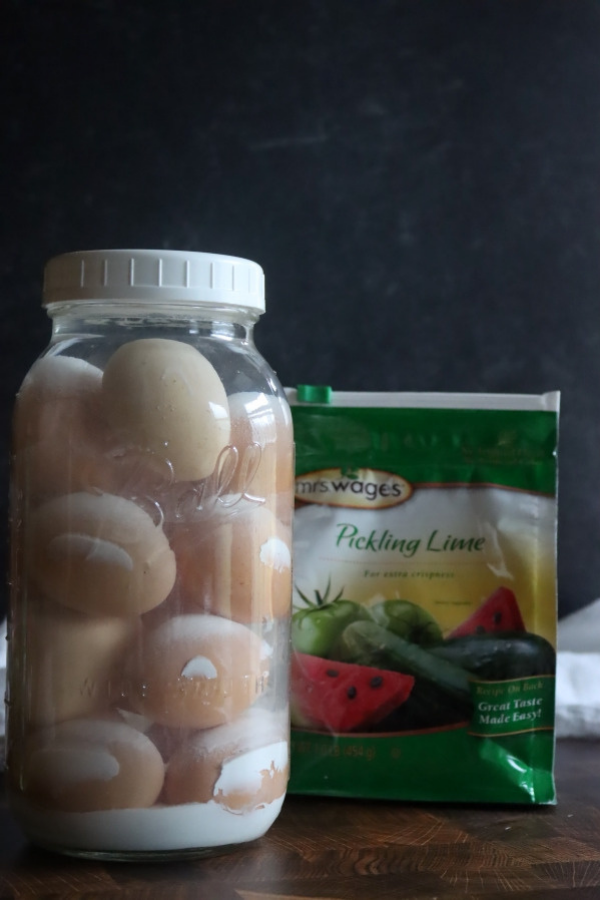
How Long Do Eggs Last in Limewater?
Properly stored, eggs preserved in limewater can last 8 to 12 months or longer. Many homesteaders report success frying, baking, and whipping limewater eggs a full year after preservation. The key is to keep them submerged, cool, and undisturbed.
When you’re ready to use the eggs, rinse each one thoroughly before cracking to avoid introducing lime solution into the egg.
Does It Change the Taste or Texture?
No—when stored correctly, limewater eggs retain their taste and texture remarkably well. They fry like fresh eggs, bake beautifully, and even whip to stiff peaks for meringue and angel food cake. Unlike waterglassed eggs (preserved in sodium silicate), limewater eggs don’t soften or change structurally over time.
Alternative Historical Lime-Based Egg Preservation
I found a reference to preserving eggs in lime water in the book from the 1950s called “Stocking Up.” It contains all manner of historical food preservation information and has a whole chapter on eggs.
It notes that most people “found some way to clog up the pores of the eggshells so that moisture would not escape and air could not enter. Eggs were rubbed with grease, zinc, or boric ointment, or submerged in a solution of lime, salt, cream of tartar, and water.”
While stocking up does not give proportions, I found a reference on a historical food and cookery site that suggest this method:
“To one pint of slacked lime, add one pint of salt, two ounces of cream of tartar, and four gallons of water. Boil all together for ten minutes. Skim, and when cold, pour it over the eggs. Lay a light saucer upon the top to keep them underwater, and keep in a cool place. Renew the lime water every three weeks.”
So for that method, you’d need:
- 1 pint slaked lime
- 1 pint salt
- 2 oz cream of tartar
- 4 gallons of water
The downside of this mixed solution is that the salt permeates the shells and will flavor the eggs, so I’d suggest going with a simple lime solution without salt.
Can I Use Grocery Store Eggs?
Unfortunately, no. U.S. grocery store eggs are washed and sanitized, removing the natural protective bloom on the shell. This makes them unsuitable for room-temperature storage or limewater preservation. Use only unwashed, farm-fresh eggs for this method—ideally from your own chickens or a trusted local farm.
In many other countries, eggs are sold unwashed and unrefrigerated, which makes preservation easier. But in the U.S., safe limewater preservation requires unwashed eggs only.
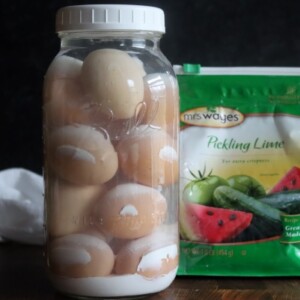
Storing Eggs in Limewater
Equipment
- Half Gallon Mason Jar
Ingredients
- 16 large eggs, fresh, unwashed eggs (collected the same day)
- 1 quart cool water
- 1 ounce food grade pickling lime, 28 g or ~2 heaping tablespoons, calcium hydroxide
Instructions
- In a quart mason jar or mixing bowl, combine 1 quart of cool water with 1 ounce of pickling lime. Stir or shake to create a saturated lime solution—it will appear milky, and some lime will settle to the bottom (that’s normal).
- Gently place 16 clean, unwashed eggs into a clean half-gallon glass jar.
- Pour the limewater solution over the eggs until they’re fully submerged. Cap the jar and store in a cool, dark place.
Notes
Food Preservation Tutorials
Looking for more historical food preservation tutorials?
- Salt-Cured Duck Breast
- Preserving Cheese in Wood Ash
- Salt Cured Egg Yolks
- 18th Century Farmhouse Cheddar
- How to Preserve a Whole Pig Without Refrigeration
Frequently Asked Questions
No. Traditional waterglass refers to sodium silicate, while limewater uses pickling lime (calcium hydroxide). Though both methods preserve eggs by sealing the shell, pickling lime is food-safe and doesn’t affect the flavor or texture of the eggs. Today, most people searching for “waterglassing eggs” are actually referring to the limewater method.
No. Grocery store eggs in the U.S. are washed, which removes the natural protective coating (bloom) and opens the shell’s pores. This makes them unsafe for room-temperature or limewater storage. Only use unwashed, farm-fresh eggs for this method.
Properly stored eggs in limewater can last 8 to 12 months or longer. The key is to keep them cool, fully submerged, and in a clean, sealed container.
No. Eggs stored in limewater retain their original flavor and texture when handled properly. They can be fried, scrambled, baked, or even whipped like fresh eggs.
No refrigeration is needed. Store the jars in a cool, dark place like a basement, pantry, or root cellar. Temperatures around 50°F are ideal.
Glass jars, ceramic crocks, or food-safe plastic buckets all work. A half-gallon jar holds about 14–18 eggs, while a one-gallon jar holds roughly three dozen.
It may give the egg a bitter or chalky taste. Always rinse the egg thoroughly before cracking to avoid introducing lime solution into the egg.
No. Always make a fresh batch of limewater for each new batch of eggs to avoid contamination and ensure a fully saturated solution.
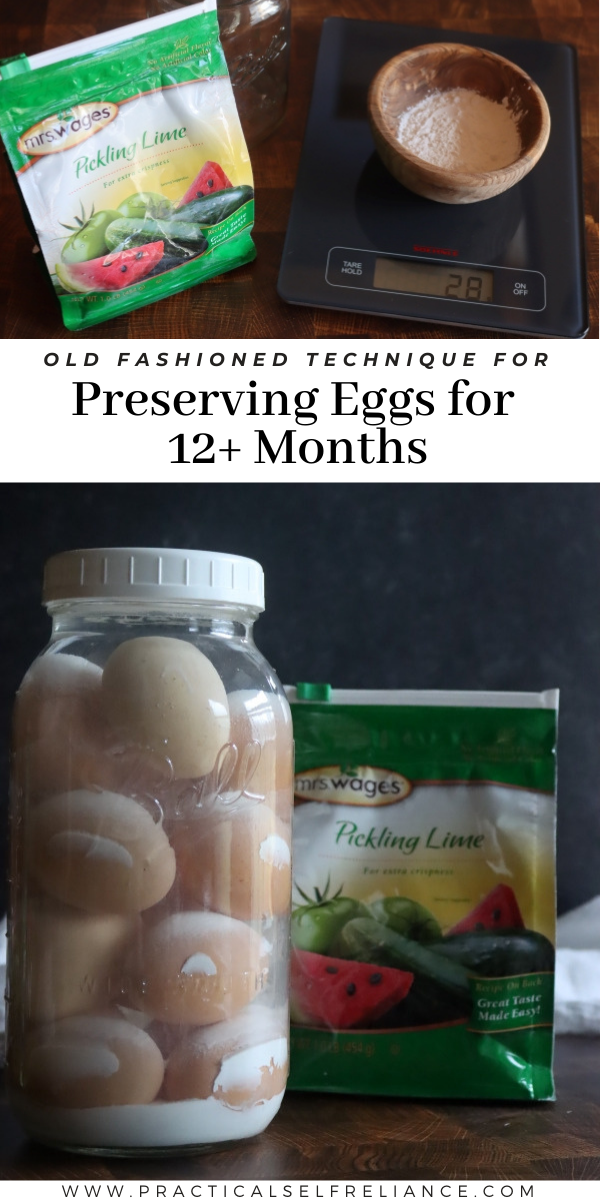
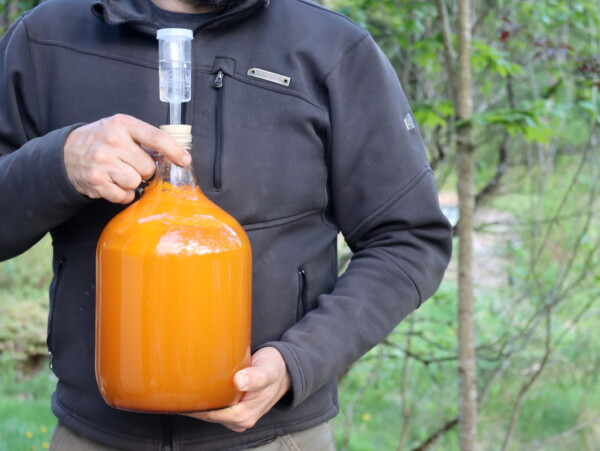
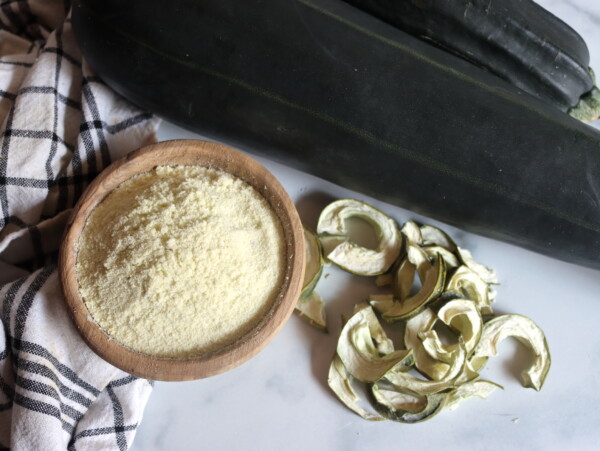
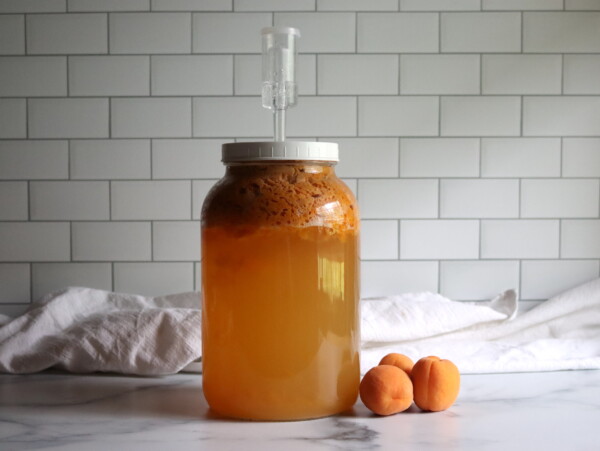
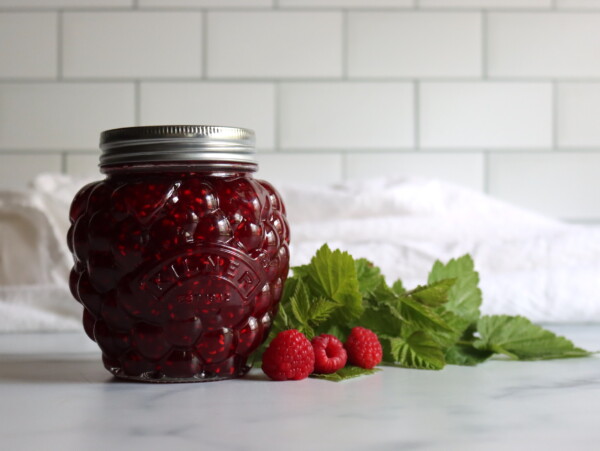










Thanks for the article! Can you reuse the lime solution or do you suggest replacing it after a certain amount of time?
That’s a good question. I don’t really know that answer but my suggestion would be to start with fresh solution each time just to be safe.
That makes sense. I did read that hydrated lime loses its effectiveness over time once it’s exposed to the air.
I had this same question… I don’t see why it wouldn’t be useful again if under the 2 year point based on other resources I’ve read, but it seems he most popular thing to do it dump used solution and begin again fresh. It’s a shame though, it seems wasteful. I’m thinking of trying this on a small scale to see what the results are for reusing solution.
question…i put fresh eggs from my chickens in lime water for the first time. the liquid toward the top appears to be getting dark. what could that be? is the whole batch ruined if i screwed something up?
Were the eggs dirty when you put them in the limewater?
actually i tried to be very careful about them being clean. i did another jar and it appears to be fine. i wonder if an egg was cracked and i just didn’t see it. i am getting ready to use them just to check the method.
Yes, that’s definitely a possibility. Something definitely wasn’t right with that first batch. Hopefully, your second batch turns out well.
Hello I’m interested in getting your answer
to Chris’ question from Jan 11, 2021, at 12:05am upstate New York. I live in western Montana and have the cold issues too. Thank you for your assistance and education! 🇺🇸🤗🇺🇸
I am actually not sure of the answer to that question. Since most people are preserving those eggs during the warmer months when the egg production is at its peak, there probably isn’t a lot of information on that.
I’m in upstate NY and cold temps are an issue. When I gather my eggs in afternoon they’re sometimes very cold (like refrigerated). I know refrigerated, unwashed farm eggs need to remain refrigerated because they can sweat and allow penetration so my question is can my cold eggs go into this solution?
Hello! I live in South Texas and I can’t store eggs at 50 degrees. Could I put them in the refrigerator?
Kind Regards, Nikki
Sounds reasonable to me?
Should I dissolve the lime ?in boiling water then let cool or just use cold water and mix well
Cool water and mix well works just fine. This is a supersaturated solution, so it’s not going to all dissolve, just put it in a jar with cool water and give it a really good shake.
I have 14 hens and a rooster. They free range but lay their eggs in coop nests and get locked in at night. On rainy days, often the eggs will have mud on them. May I preserve dirty eggs in the pickled lime?
Nope, they’ve gotta be clean. Ours get dirty too, but we save those for fresh eating (or store them in the cool pantry, unwashed for up to 4 weeks). Long term storage eggs like this need to be clean on their own.
Thank you so much for all of your knowledge. I only have a few hens, and it could take a few days to get enough eggs to fill a half gallon jar. Could I make it up and add eggs each day after until it’s full, or does it all need to be done at once?
So I’ve done that, but I don’t pour all the lime water in at once. I make the lime water and keep it to the side, then I put the eggs I have in the jar. I pour the lime water over the top to cover them by about an inch and stop. The next day, I add more eggs and then add more lime water (shaking the separate lime water jar to make sure it’s really distributed in there before pouring it over) to top it off and keep them covered by at least an inch.
This honestly might not be strictly necessary, as in theory the lime water should be completely saturated in the jar and you should just be able to add them…none the less, that’s the way I do it for perhaps irrational reasons. Either way, that way works for me!
Thank you! Was about to ask the same question!
You’re very welcome.
Hi Ashley, thank you for this post. I’ve often wondered just HOW to preserve eggs, and now you’ve helped with this question. Again, thank you! love your blog.
My hens do not produce a large amount of eggs, but I would like to know if I can preserve them daily. In other words, can I start with an initial batch, and then add whatever is laid that next day (at least until I exceed the container).
So I’ve done that, but I don’t pour all the lime water in at once. I make the lime water and keep it to the side, then I put the eggs I have in the jar. I pour the lime water over the top to cover them by about an inch and stop. The next day, I add more eggs and then add more lime water (shaking the separate lime water jar to make sure it’s really distributed in there before pouring it over) to top it off and keep them covered by at least an inch.
This honestly might not be strictly necessary, as in theory the lime water should be completely saturated in the jar and you should just be able to add them…none the less, that’s the way I do it for perhaps irrational reasons. Either way, that way works for me!
Two questions….I have 3- 1/2 gallon jars filled, I am keeping them in the refrigerator because I don’t have my root cellar in place yet, Is this okay? We live in Az and I don’t have 50 degrees anywhere in my home.
And…I also noticed yesterday that 2 eggs in one jar have a fracture. I took them out and cracked them (not to eat) and the membrane was still intake. The rest of the eggs look fine, with no change in the color, but does fall in the category of one cracked egg will spoil the whole jar?
Love your site!
It definitely won’t hurt to keep them in the fridge. As far as the cracked eggs, I would just try to use up that batch as soon as possible. You may be ok it the membrane was still intact and you will certainly know if any of the other eggs are bad.
Thank you Ashley for this and all you do! I was just thinking about this (best way to preserve eggs) because eggs are so useful and nutritious. I’ve been exploring other methods of preservation such as fermentation and dehydration (did you know you can dehydrate egg yolks?), and I’m in the process of perfecting a killer fermented hot sauce made with the abundance of peppers I got from my organic garden this year! My question is, I wonder how long these would last at “room temp”? I do tend to keep my house on the cooler side (64-67 F) but sadly I don’t have a root cellar and keeping them in the fridge kind of defeats the purpose, although I do understand that they would last longer than if they weren’t in lime water, but my refrigerator space is limited. So how long do you think they would last at an average temp of 65 F? Thanks!
Good question, and honestly, I don’t have a good answer for you. I know I’ve kept eggs (just unwashed in cartons) at room temp for about 4 weeks without issue, but in my basement, they last about twice that…sometimes more. I’m sorry, I wish I knew the answer to this one.
28 days from the time it was layed is the general timeframe that eggs can sit out of the refrigerator after collecting from your hens.
I enjoy your articles! I was raised on a chicken farm, having 7,000+ hens, and I never imagined there was a way to store eggs for so long-we had no need to store eggs as they were in constant supply. The video was awesome, great article!
I have boughten farm eggs, they have been rinsed in water not washed with soap. Will they work?
Once the eggs have been washed, even with plain water, the bloom is removed which protects and helps to preserve the eggs.
What if i put the eggs them in the pickling lime dirty. Can i remove and use if only 24 hours. The recipe i had found never said clean unwashed eggs.
It’s very important to use fresh, clean eggs that have been gathered that day.
I put mine in a large bucket. I had 9 dozen. Sometimes they float to the top and are not completely submerged. What do I do about that?
Once eggs are in solution can you add more eggs each day?
the modern version of the old fashion earthenware crocks is the modern pop cooler – a great protective & climate control storage tote for a variety of fragile type items when not in food preservation mode …..
with a larger size storage tote you can store the eggs in the traditional dozen lot egg cartons >> this also assists with a monthly 180-degree rotational flip that many egg preservists recommend (keeps yoke from attaching to shell – ?????) ….
Love to try the lime solution for saving my eggs up to a year!
Would this work on store bought eggs?
No, this won’t work with store-bought eggs, at least in the US where they’re always washed before getting to the store. (In other countries, they actually often intentionally don’t wash the eggs before market so they keep longer.)
In the US, they’re washed before they’re packed, which means their pores are open and bacteria is getting inside the egg from the moment it leaves the farm. That’s why they must be refrigerated, to prevent the bacteria that have already gotten in from proliferating.
(Farm fresh egg that are unwashed, on the other hand, can be stored at room temperature for extended periods without issue, and this is what they do in Europe and most of the rest of the world.)
If you’re lucky and find a good local farmer you trust, you can purchase fresh unwashed eggs from them in bulk to store, but you can’t use anything from a grocery store refrigerator case.
So sometimes my eggs are dirty with poop, mud etc. Do you just leave them that way when preparing to store them in the pickling lime?
You can’t preserve those unfortunately. This technique only works with eggs that come out of the coop clean, and all others should be saved for immediate use. If you want to use this technique, you really have to meticulously maintain your nesting boxes, even still probably 20% of the eggs will still be dirty. That’s ok though, as you can still preserve most of them, and you’ll still have the dirty ones for fresh eating now.
Can you take the eggs out as needed or do you need to use them all once the jar is opened ?
Yes, you can just take the eggs out as needed.
Could you use store bought eggs?
No, this won’t work with store-bought eggs, at least in the US where they’re always washed before getting to the store. (In other countries, they actually often intentionally don’t wash the eggs before market so they keep longer.)
In the US, they’re washed before they’re packed, which means their pores are open and bacteria is getting inside the egg from the moment it leaves the farm. That’s why they must be refrigerated, to prevent the bacteria that have already gotten in from proliferating.
(Farm fresh egg that are unwashed, on the other hand, can be stored at room temperature for extended periods without issue, and this is what they do in Europe and most of the rest of the world.)
If you’re lucky and find a good local farmer you trust, you can purchase fresh unwashed eggs from them in bulk to store, but you can’t use anything from a grocery store refrigerator case.
You have the patience of a saint.
Lol! I agree! If people would read the article or blog that is with the recipe, it would save a lot of time and frustration on the part of the poster! 😉
Could you please define ‘lime’ for me. Are we talking about lime extracted from the fruit or lime that is added to soil and other things to cleanse and alter acidity? As the latter is a harsh substance I feel it warrants checking before use. Many thanks
It’s a specific type of lime (calcium hydroxide), which is processed from limestone. It’s a white powder, as shown in the pictures, and has nothing to do with limes the fruit.
There are multiple preparations of limestone, many for agricultural use that are processed in different ways and are chemically different, but what you want is food safe pickling lime labeled as calcium hydroxide. This particular preparation involves cooking limestone in kilns and then processing it with water before it’s packaged as a dry powder.
It’s not anything chemically crazy, just limestone that’s been prepared a specific way.
Many thanks for the clarification. Often when we read information originating in a different country to our own, meanings often differ. For instance I have my own hens and I also possess a bag of horticultural lime! So glad I thought to ask lol!
I read most of the questions and your answers and I think you are spot on correct. Did you know that this was the preferred method used at Mount Vernon by George and Martha Washington? Chickens back then often quit laying in the winter. Ours are better today, but many slow egg production in winter today also. You had extra in summer, and few if any in winter. Good post, thank you.
I found some at our local Ace Hardware It is the regular Pickling lime.
Love this suggestion. Love your site. I read it every day, as an antidote to political drama. Thanks so much!
Wonderful, glad you found it helpful and so glad to have you along!
Interested to try this, but I was a bit unclear–if I happened to get some unwashed eggs from someone a couple of weeks ago (I did) and they’ve been sitting unwashed in the fridge all that time, can I try putting them in the solution or do they need to be like….that day fresh?
They should be same-day fresh and never refrigerated.
I’m sorry, not sure why that says fridge….they’re in the basement. I went ahead and did the task. Some floated up which I figured are older, the rest sunk to the bottom and are submerged under a few inches 9f solution. I like to think the bucket sorted them for me. The floaters are now teriyaki pickled eggs!
What happens when they have been refrigerated? And then water glassed? How do you tell if your water glassed eggs have went bad?
They really need to be eggs that you have gathered the same day and they need to be clean and unwashed. If they have been washed, if they are dirty or if they are not gathered the same day, they should not be water glassed. Just like any other egg, you will know when they are bad as soon as you crack them.
Can you reuse the lime water or should it be made fresh everytime?
Make fresh each time.
When I asked this question months ago on another site, I was told to use that day’s eggs. So I’ve been putting 3 dozen in a gallon bucket which could be 2-3 days of eggs, not washed (I wipe them off with dry cloth and only use clean eggs) and NOT refrigerated. I haven’t opened any yet, but am assuming they will be gone when I do on December. They will be 6-8 months old at that time.
Amen !